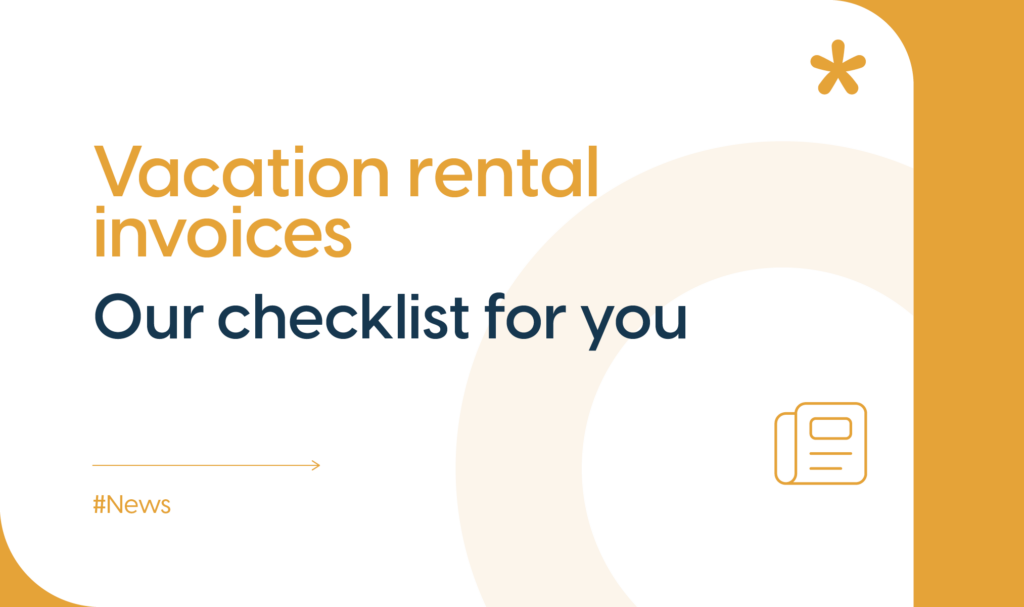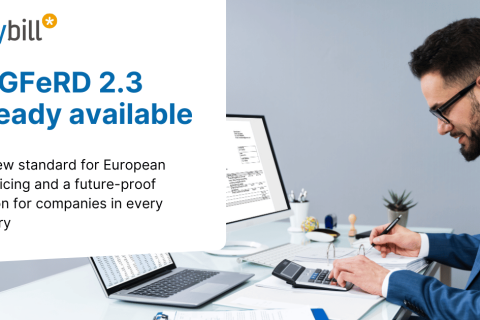
The summer vacations are still running in most German states. High season for the rental business for vacation apartments and vacation homes.
Do you also own such a property? Or are you just getting into the business and don’t quite know yet what you have to consider, especially for invoicing? Our checklist with 10 helpful tips will help you to be best prepared.
When you create invoices for vacation rentals, various aspects should be taken into account to ensure smooth and legally correct processing. We have compiled the most important points for you.
Table of content
- Point 1: Capture complete contact details
- Point 2: Do not forget the invoice number and date
- Point 3: Terms of reference for the tax office
- Point 4: Price information transparent and understandable
- Point 5: Include payment conditions
- Point 6: Always keep an eye on tax information
- Point 7: Legal information
- Point 8: Invoice language ensures customer satisfaction
- Point 9: Archiving
- Point 10: Automation thanks to invoicing software
Point 1: Capture complete contact details
The contact details of the tenant, but also those of you as the landlord, are mandatory elements on an invoice. Without this information, the invoice is not valid for tax purposes and counts as a receipt. Therefore, in any case, make sure that your invoices always contain the complete address data of both parties.
An address is considered complete if the name, address (street, house number if applicable, postal code, city and in the case of international invoices also the country), a telephone number and perhaps your e-mail address are listed.
Point 2: Do not forget the invoice number and date
If your tax office has not already pointed this out to you, we are also happy to mention it: the unique invoice number is also a mandatory component of an invoice. It should be unique in your system and enable precise identification of the invoice.
In addition, an ascending chronological order in the numbering facilitates the tracking and organization of payments.
Point 3: Terms of reference for the tax office
It is useful information not only for your customer. Maybe the same customer books with you at several periods? Describe the services provided in detail.
Also list the period and duration of the stay. If necessary, mention the address of the vacation apartment or vacation home again to avoid any confusion. If your tenant has booked additional services at the same time, list these on the invoice as well.
Point 4: Price information transparent and understandable
Have you thought of everything? Then record the costs for the vacation home transparently on your document. In addition to the rental fees, there are often additional costs, taxes or potential additional services.
Very important: Discounts or surcharges should be clearly visible on your invoice so that the tax office does not have to ask any questions. Your customer’s satisfaction will certainly increase if he receives a transparent invoice with all costs without being asked.
Point 5: Include payment conditions
Now the invoice is issued, but you do not receive any payment? Perhaps the terms of payment were forgotten?
Save yourself the annoying and unnecessary waste of time. Liquidity is important for any business, so it is strongly recommended that you clearly state the payment terms on the invoice.
Mention payment terms, such as payment deadlines, payment methods and bank details. Also indicate if a deposit is required and how much it is. Especially in your business of renting it is absolutely common to work with down payments.
Point 6: Always keep an eye on tax information
As with every invoice, always keep in mind that all mandatory tax information is included on the invoice. Only if the contents are really complete will there be no tax hurdles afterwards.
Tip on the side: easybill ensures compliance with all mandatory information. Forgetting them is out of the question!
Point 7: Legal information
Nothing would be more annoying than having to deal with your customer because he cancels his booking, for example. However, he did not know or did not understand your cancellation conditions. Already there is displeasure, on both sides of course, and quite rightly so. To avoid misunderstandings with your customers, add legal information in the best case. Give your tenants your cancellation conditions, liability exclusions or data protection regulations at the same time.
Protect yourself and your customers so that nothing stands in the way of a positive relationship. Even in the event of a cancellation, the customer may come back to you at a later date. It should connect you with a positive thought.
Point 8: Invoice language ensures customer satisfaction
And speaking of misunderstandings: make sure your invoice is written in a language your tenant can understand. You should avoid unnecessary language barriers or “official German”.
Always remain transparent and clear in the information on your documents. Nevertheless, discuss with your tax advisor or even your responsible tax office whether you should issue your documents in languages other than that of your registered office. International customers in particular will certainly feel well looked after if they receive a booking confirmation or an invoice in their local language.
Point 9: Archiving
Keeping records of business transactions is, of course, the be-all and end-all. For your files, carefully keep all copies of all documents and relevant records to enable proper accounting and possible later inquiries. Observe the legal retention period for invoices and the like.
Maybe your customer would like to book again after 3 years and use the same arrangement as back then. Wouldn’t it be an advantage if you could still access these documents and offer him this service?
Point 10: Automation thanks to invoicing software
Everything these days revolves around automation. And rightly so. Because you already have enough things on your plate in your day-to-day work and of course you can allow yourself some luxury and automate tasks such as invoicing. Feel free to use modern software solutions or tools for invoicing to simplify the process and minimize errors.
easybill has plenty of connections to booking platforms and third-party providers for vacation rentals. Check directly once whether your booking platform also supports an interface.
Make your everyday life easier by letting easybill automatically receive customer data, booking information and other details and transfer them to your booking confirmations or invoices. Send the documents to your customers via email or mail and focus on other things for your business.
By keeping these aspects in mind, you can ensure that your vacation rental invoicing is professional, transparent and legally compliant.
Read also:
Successful invoicing for small business owners: 7 key facts for your business
Effective invoicing: How easybill-CSV Import helps you create invoices
How liquid queries in easybill make everyday work easier




